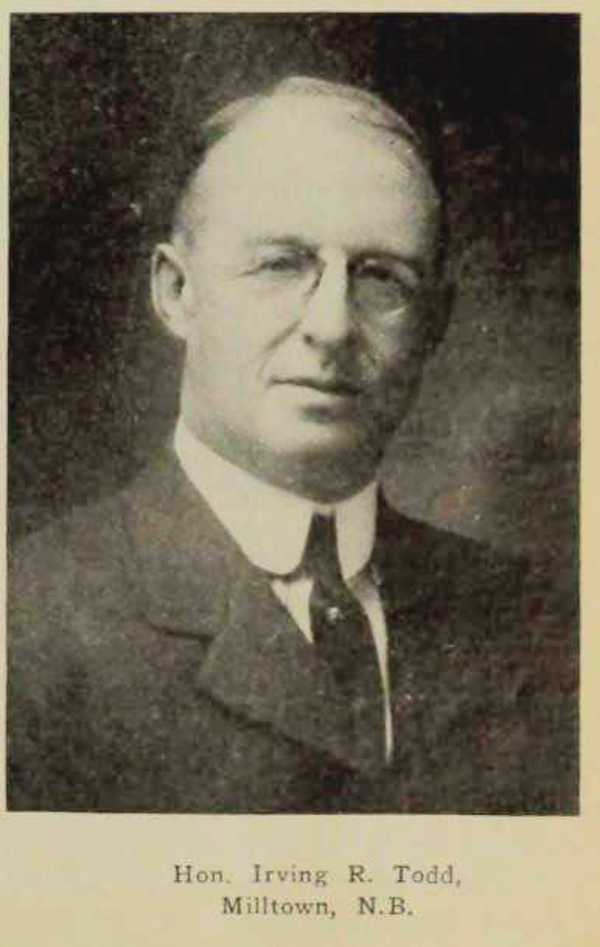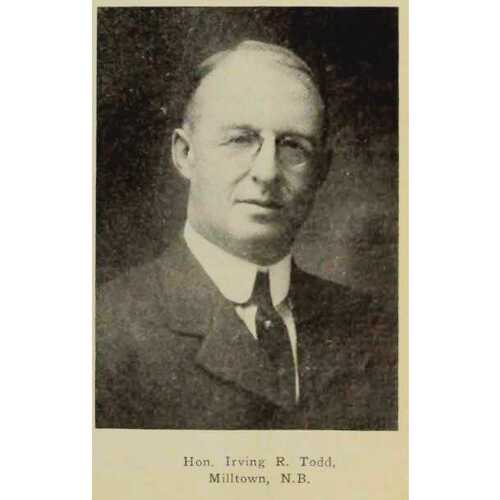
Source: Link
TODD, IRVING RANDALL, lumberman, manufacturer, businessman, and politician; b. 15 Dec. 1861 in Milltown (St Stephen-Milltown), N.B., eldest child of Charles Frederick Todd and Anna Maria Porter; m. 21 June 1883 Frances Esther Boardman (d. 25 Feb. 1936) in St Stephen (St Stephen-Milltown), N.B., and they had one son; d. 27 Dec. 1932 in Milltown.
Irving Todd’s great-grandfather William Todd crossed the St Croix River from Maine to New Brunswick, settling at St Stephen in 1811. His grandfather William Todd* was prominent in business and politics and declined the offer of a senatorship in 1867. After studying at Milltown High School, young Irving went on to Maine’s Hallowell Classical Institute, a preparatory school for Bowdoin College. His father, C. F. Todd, had attended Bowdoin, but Irving, described in a family history as “a high-spirited boy,” was expelled from Hallowell for dumping a bowl of mashed potatoes from a window onto the principal’s head. His formal education having concluded prematurely, Todd returned to Milltown, where in 1879 he entered into the family business of manufacturing and shipping lumber. Eight years later he was made a partner in C. F. Todd and Company, and in the winter of 1891–92 his father, terminally ill, handed over the firm to him. When C. F. died the following year, his estate was found to be insolvent as a consequence of bad investments, and to pay off this inherited debt Irving was forced to sell the company to a Maine concern.
Starting out anew, Todd spent a decade employed in a senior capacity with the St Croix Log Driving Company and then founded a new industry in the region in 1903 when he set up the Eastern Pulpwood Company. Because this type of manufacturing used small logs of various kinds, Todd could exploit the depleted forest resources of the St Croix in a way that lumberers could not. Pulpwood was also essential to the rapidly expanding industry of newsprint making, and Eastern Pulpwood did so well that in 1911 Todd divested himself of his interest in the company and gave up manufacturing altogether. He would spend the rest of his business career in boardrooms, effortlessly making the transition from industrialist to corporate capitalist.
Todd was a close friend of Conservative premier George Johnson Clarke, and he reluctantly became president of the scandal-ridden Saint John and Quebec Railway Company after the province took it over in August 1915 [see James Kidd Flemming*]. Not wishing to be connected or identified with this discredited venture any longer than was necessary, he served only until the end of December. Four years later Todd became president of the New Brunswick and Canada Railroad Company; he also held the presidency of Fundy Fisheries, and was a director of Ganong Brothers [see Gilbert White Ganong*] as well as, from 1918, the New Brunswick Telephone Company Limited. He was senior vice-president of NBTel from 1923 to 1928, when he was succeeded by Howard Perley Robinson* and retired from the business world.
The Todds were Liberals, and despite having grave doubts about the wisdom of free trade with the United States, Irving loyally supported Prime Minister Sir Wilfrid Laurier* and the federal party through the general election of 1911. Laurier’s opposition to conscription during World War I was, however, too much for him. In 1917 Todd not only defected to Prime Minister Sir Robert Laird Borden’s Unionists, but also chaired their organization in New Brunswick; in addition, he successfully ran their campaign in Charlotte, where his cousin William Frederick Todd, standing as a Laurier Liberal, failed to reclaim the seat he had lost in 1911. Irving’s commitment to the Borden government’s policy on military manpower was deeply personal rather than political. Though he served on the provincial recruiting committee and the Belgian Relief Fund and managed two Victory Bond campaigns, “his greatest war work,” one obituarist judged, “was undoubtedly his many unrecorded acts of help and sympathy to those families who had sons serving overseas.” After Todd and his wife, Fannie, learned that their only child, Charles Frederick, had been severely wounded in action, they ignored the risk of a German submarine attack and crossed the Atlantic to attend to him at a military hospital in London. Their ship struck a mine 20 miles from the coast of England, and the couple endured a harrowing night in separate lifeboats before being reunited in Liverpool.
Todd’s staunch support of the Union government was rewarded in March 1918 when Borden – apparently at the instigation of New Brunswick’s representative in cabinet, fellow Unionist Liberal Frank Broadstreet Carvell* – appointed him to fill the province’s Senate vacancy. After the war Todd was among the senators whom the new Progressive parliamentary caucus tried unsuccessfully to recruit [see Thomas Wakem Caldwell]. He served in the Senate until his death 14 years later from inoperable stomach cancer, less than two weeks after his 71st birthday.
Irving Todd was an astute entrepreneur from the southwestern border country of New Brunswick who, having had to start over, achieved significant business success and exploited it to gain traction in the elite corporate and political circles to which he would not otherwise have had access. The product of two generations of prominent merchant-manufacturers, he cleverly traded on his resonant family name – but only after rebuilding the family fortunes.
PANB, RS63 A, 1932, Irving Randall Todd. Calais Times (Calais, Maine), 1903–11. Eastport Sentinel (Eastport, Maine), 1903–11. Saint Croix Courier (St Stephen [St Stephen-Milltown], N.B.), 1893–1932 and 29 Dec. 1937. Can., Senate, Debates, 1918–32; Journals, 1918–32. Canadian annual rev., 1915–32. H. A. Davis, An international community on the St. Croix, 1604–1930 (Orono, Maine, 1950; repr. 1974). A. T. Doyle, Front benches & back rooms: a story of corruption, muckraking, raw partisanship and intrigue in New Brunswick (Toronto, 1976). I. C. Knowlton, Annals of Calais, Maine and St. Stephen, New Brunswick … (Calais, 1875; repr. St Stephen, [1977]). N.B., Legislative Assembly, Journal, Interim and final report of commissioner J. M. Stevens, k.c., re Saint John and Quebec Railway Co., 1918. William Todd, Todds of the St. Croix Valley (Mount Carmel, Conn., 1943).
Cite This Article
Barry Cahill, “TODD, IRVING RANDALL,” in Dictionary of Canadian Biography, vol. 16, University of Toronto/Université Laval, 2003–, accessed December 20, 2024, https://www.biographi.ca/en/bio/todd_irving_randall_16E.html.
The citation above shows the format for footnotes and endnotes according to the Chicago manual of style (16th edition). Information to be used in other citation formats:
| Permalink: | https://www.biographi.ca/en/bio/todd_irving_randall_16E.html |
| Author of Article: | Barry Cahill |
| Title of Article: | TODD, IRVING RANDALL |
| Publication Name: | Dictionary of Canadian Biography, vol. 16 |
| Publisher: | University of Toronto/Université Laval |
| Year of publication: | 2020 |
| Year of revision: | 2020 |
| Access Date: | December 20, 2024 |



